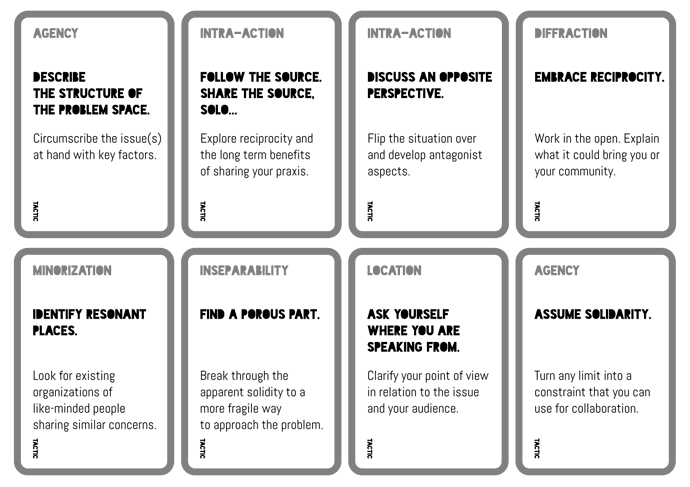At #cooperation:paf, we experimented with a card game made of two or three decks: concepts, questions, and tactics.
Game Play
Concepts
- Agency
- Allagmatique
- Analogie
- Temps commun
- (Diffraction)
- Geste
- Immediacy
- Included Third
- Inséparabilité
- Intra-Action
- Location
- Minorized
- Porosité
- Résonance
- Speculative Fiction
- Symbiogenesis
- Transduction
- Ubuntu
Questions
Ask a question related to your technological practice, understanding, concerns or difficulties.
- Do you sometimes feel alone when sharing local concerns or engaging in critical thinking?
- What do you find difficult when you try to convey complex ideas about your practice?
- How do you ensure follow-up of the people involved?
- What difficulties do you meet to ensure perennity of your group?
- How do you use surveillance systems?
- What makes you think others are touched or resonate with your proposition?
- What are the informatics tools you use everyday?
- What makes your actions meaningful?
- Was your community ever hit hard by software? (unavailability, malfunction, inadequacy, etc.)
- How do you share what you produce electronically?
- How do you make your knowledge evolve? What actions do you take to make your knowledge evolve?
Tactics
Agency
-
Describe the structure of the problem space.
Circumscribe the issue(s) at hand with key factors. -
Assume solidarity.
Turn any limit into a constraint that you can use for collaboration.
Allagmatics
- Watch out for operations.
Dissect the operations transforming the structure.
alternate proposition:
Dissect and understand the relation between the different moments when the structure transforms
Analogy
- Displacement
Present the same situation in another environment, for example what would happen if we were talking about food.
Common Time
- Remove yourself from emergency.
Consider the lack of time as an illusion: time is a co-creation, organize moments to construct together another space for living.
(Diffraction)
- Embrace reciprocity.
Work in the open. Explain what it could bring you or your community.
Geste
- Jump!
Prolong your thought with concrete action.
Immediacy
- Examine how the relation is mediated by whom.
Instantaneous communication often do not elicit the mediated relation.
Included-third
- Find the excluded third.
Think of what is necessary to produce the process described and that is usally not taken into account.
Inseparability
- Relations in digital space engage you.
Reformulate the issue in a space that associate people in mutual respect.
Intra-action
-
Follow the source. Share the source, solo…
Explore reciprocity and the long term benefits of sharing your praxis. -
Discuss an opposite perspective.
Flip the situation over and develop antagonist aspects.
Location
- Ask yourself where you are speaking from.
Clarify your point of view in relation to the issue and your audience.
Minorized
- Identify resonant places.
Look for existing organizations of like-minded people sharing similar concerns. - Hear what is unspoken.
Read between the lines, learn from history, uncover what remained silenced.
Porosity
- Find a porous part.
Break through the apparent solidity to a more fragile way to approach the problem.
Resonance
-
Listen carefully.
Some other meaning is escaping you. Find it! -
Reformulate.
Explain again differently and acquire new understanding.
Speculative Fiction
- Some part of the story might be untold.
Imagine possible histories stemming from usually discarded possibilities.
Symbiogenesis
- 1+1=1
Consider the intricate relations in that situation, how does co-depencies bring the possibility of an evolution.
Transduction
- Start from the center.
Seize the emerging dimensions that are bringing resolution.
Ubuntu
- Unfold commonalities.
Discern affections and perceptions, differences that make similarities. - I am because we are.
Think of ways to transform the situation that could as well transform your relation to someone else, or to a group of persons.

